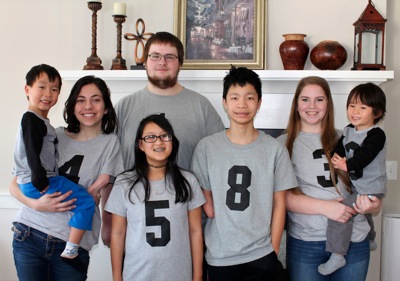At her local church in Yerevan, Armenia, Siranush lit a candle and prayed that her daughter would survive the night. Lusine, 22, was hovering between life and death in a nearby hospital after a terrible car crash. As Siranush pleaded for her daughter’s life, she offered up something in return. “If you save Lusine, I promise I will find out what happened to Meri,” she prayed. “Wherever she is, I will find her.” For Lusine was not Siranush’s only daughter.
Five years earlier, she and her husband, Artur, had a baby girl. But after a long delivery fraught with complications, the baby, Meri, had died. Armenia Orphanage Witness - After spending the first five years of her life in an orphanage, Meri is enjoying living with her family. © 2016 Human Rights Watch At least, that’s what they told their family. But as Siranush prayed that night, she was also grappling with something heavier on her conscience. The fact that Meri had not, in fact, died at birth. “We committed a sin about Meri,” Artur says. “But now we wanted to find her again.” And so with one daughter fighting for her life, Siranush and Artur began, belatedly, to fight for their other one – the daughter born different who, like many similar children in Armenia, are needlessly torn from their parents and put into institutions.
The “sin” Artur talks of began on August 12, 2009. Siranush’s labour was not going well. The baby’s heartbeat was weak and doctors performed an emergency Caesarean. After an interminably long wait while Siranush had the surgery, a gloomy-looking doctor appeared before Artur. She explained that while his wife had been saved, their daughter Meri had been born with heart defects and Down Syndrome. Then their trusted family doctor broke even worse news: Meri would very likely die within a few days. She said it was best if Siranush and Artur returned home and left Meri to die peacefully in the hospital. “You have other children already,” the doctor reminded them. Siranush was fiercely against leaving Meri behind, but Artur gently persuaded her to follow their doctor’s advice.
As small-scale fish farmers, the couple had no medical knowledge or reason to doubt the professionals if they said it was hopeless. And so Siranush and Artur’s secret began. The questions about where their baby was were so painful, Artur says, it was simpler to tell everyone she had died. In the following weeks, the family tried to return to normal. But Siranush could not. Armenia Orphanage Witness -
Lusine helps to feed her sister Meri. The pair have formed a very close bond. © 2016 Human Rights Watch Even though the couple guessed Meri must have died soon after they left her, Siranush continued to sense her daughter’s presence. As the months turned to years, she began having a recurring, vivid dream that Meri was alive. For his part, Artur had convinced himself that Meri was dead. But Lusine’s car accident quickly unravelled his conviction. “We were at church constantly,” Artur recalls. “My wife began worshipping, promising that whatever happened to Lusine, we will find Meri and lighten our sin.” And so Artur and Siranush set to work. Within days, they discovered that Meri had survived and been moved among various orphanages.
With the help of a relative, they managed locate her in an orphanage in Yerevan, a short drive from their home. Finally, after five long years, they met the daughter they had reluctantly abandoned. “They brought Meri to me, and I was shaking all over my body, I couldn’t help it,” says Artur. “I was hugging the child, I couldn’t speak. My tongue was tied. It was very emotional.” Five years in an orphanage had taken its toll on Meri. She could not walk, and got around by crawling. Artur describes an instant bond with the daughter he last saw when she was just three or four days old: “You can’t imagine it, but she recognized me immediately. Solely on our blood connection she could feel it. It was instinct.” The family swiftly met with the orphanage director, “a good woman,” who agreed to let Artur and Siranush take Meri home just 40 days later. She warned them it would be hard, but their mind was set.
Five years in an orphanage had taken its toll on Meri. She could not walk, and got around by crawling. She did not speak, and did not even scream to communicate. But she felt instantly at home. “There was an impression that Meri knew all the corners in our apartment,” said Artur. “She accepted us easily. She did not appear upset with us. Either from our warmth, or our common genes, she felt like we are her family.” Armenia Orphanage Witness - Lusine and Meri and her elder sister Lusine. © 2016 Private In the loving care of a warm home, Meri, now almost 8, began to change. She’s formed a strong bond with her elder sister, Lusine, who survived her accident, and now dotes on her newfound sibling with obvious affection. Meri has learned to walk, and can even say simple words like “ma” and “pa.” “The difference is like mountains,” says Artur proudly. “We are hopeful, we believe, that a lot of things will change in her.” She adores music, and has a keen sense of humor. While she can’t do some things other children can, she loves to be hugged, especially as she holds her dad around his neck. Meri’s story may seem incredible, but it’s not unique. More than 3,000 children live in orphanages or other institutions in Armenia. But, as Human Rights Watch found for its report, many of them are needlessly separated from their parents. Sometimes it’s because the child has disabilities, sometimes it’s because the family is too poor to cope.
A staggering 90 per cent of children living in institutions in Armenia have at least one living parent. Institutions are expensive, too. It costs the Armenian government US$3,000 to US$5,000 a year to house a child in a residential unit. Caring for them at home would cost less. Foreign donors who want to help disadvantaged kids have flocked to support the country’s orphanages. While institutions can look clean and decently equipped, they are frequently overcrowded, with up to 15 children for every two caregivers, meaning the children get scant individual attention. Children adhere to a strict daily routine that is convenient for the institution but ignores their individual needs and desires. February 22, 2017 Report “When Will I Get to Go Home?” Abuses and Discrimination against Children in Institutions and Lack of Access to Quality Inclusive Education in Armenia Download the full report in English Ներբեռնեք ամբողջական զեկույցը հայերեն - Download the full report in Armenian Download the "easy to read" version in English Ներբեռնել «հեշտ է կարդալ« տարբերակը հայերեն - "easy to read" version in Armenian Ultimately, even the most well-resourced orphanage can’t replace a home. All children have the right to grow up in a family, where they can get the attention and nurture they need to thrive, as Meri’s story shows. Now that Meri is finally home, her next step is to attend school. On paper, all children in Armenia have the right to attend their local community schools, and the government is supposed to provide inclusive education and support children with disabilities to study alongside their peers. Armenia Orphanage Witness - Meri
The hope is that one day Meri may be able to join her peers and attend a local community school. © 2016 Human Rights Watch In fact, the Armenian government has committed to provide inclusive education across its school system by 2022. This is an important pledge. But many schools struggle to provide a quality education for children with disabilities. And stigma against these children, while slowly changing, is still an issue. Meri’s parents are anxious about how a school system that is still figuring out how to meaningfully include all children with disabilities will support Meri. So for now she attends a program for children with Down Syndrome. Artur and Siranush feel deep shame for having given Meri up. But they say they would never have done so if their family doctor hadn’t convinced them it was for the best. And they are not alone. Social stigma, poverty, lack of community-based services, and misleading medical advice means hundreds other parents in Armenia are pressed into the same, devastating choice. Despite the grief they still carry, Siranush and Artur say they now feel blessed. “We found our lost princess,” says Artur. “Meri is our happiness and we all love her.” Your tax deductible gift can help stop human rights violations and save lives around the world.
Robin Sizemore, fair warning Human Rights Watch and the Armenian Community are working hard to keep ALL Children of Armenia "in" Armenia. We will provide for all children and make sure that all children have a home in Armenia to stay with their birth parents. Hands Off Armenian Children you profiteer making $2 million in 5 years is well noted in Armenia.


















